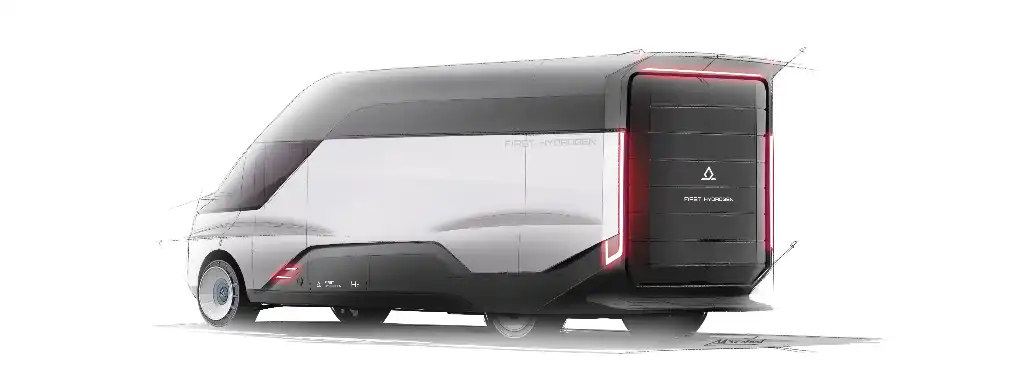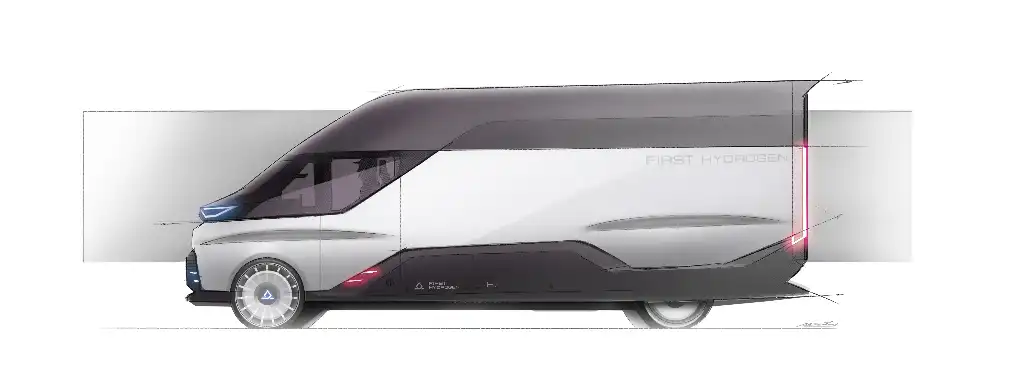Home »
First Hydrogen is set to launch fleet trials for its hydrogen-fuel-cell-powered vehicle (FCEV) in response to mounting interest from parcel delivery companies.
Following successful preliminary fleet tests amongst UK operators, the company's proof-of-concept demonstration vehicles are will undergo evalutaions with several parcel delivery firms in the latter part of Q3 and throughout Q4 of this year.
Previously, First Hydrogen predominantly catered to sectors like utilities, necessitating emission-free vehicles capable of extended travel distances and heavier loads. The current challenges confronting parcel delivery firms have prompted them to explore alternative zero-emission technologies. Although parcel couriers typically do shorter journies, from local hubs to end users, they are progressively undertaking longer routes from distribution centers to collection lockers and stores. The need for adaptable emission-reducing solutions is therfore becoming more necessary.
First Hydrogen's engineers emphasise that while these vehicles are engineered for long-haul journeys, they have been outfitted with hybrid engines (hydrogen fuel cell and battery), optimised for shorter urban routes. The incorporation of regenerative braking also assists in recharging the battery, especially during stop-and-start journeys.
An additional advantage is the rapid hydrogen refueling, which significantly reduces vehicle downtime compared to electric vans. Refueling First Hydrogen's light commercial vehicles takes around 5 minutes. Hydrogen vans can therefore have extended daily operational cycles, enabling vehicles to remain on the road for longer.
Steve Gill, CEO of First Hydrogen Automotive, said: "The mounting pressure to reduce carbon footprint, coupled with the emergence of low and zero-emission zones in urban areas and the phasing out of petrol and diesel vehicles, positions hydrogen mobility as a pragmatic solution for the challenges confronting last-mile delivery operators. Fleet managers are recognizing that relying solely on battery electric vehicles (BEV) may not suffice to meet the reliability and operational adaptability needed to meet customer demands. Future fleets should integrate both BEV and FCEV to surmount these hurdles and achieve net-zero targets. The expansive and expanding parcel delivery sector is in dire need of environmentally sustainable and economically viable fleets, and our hydrogen-powered light commercial vehicles hold the potential to fulfill this demand. This presents us with an exciting prospect to tap into a new customer base, further expediting business expansion and potentially expediting our vehicle's market entry."
The First Hydrogen Generation II concept has been revealed giving customers a hint at what the real van might look like.
The vehicle will be available with both fuel cell electric and battery electric drivetrains. Customers will have the option to choose the technology that best suits their needs.
The new images released by the company reveal the vehicle's overall form and some of its technical features. The vehicle has an aerodynamic fuselage, which will help to reduce wind resistance and increase efficiency. The muscular and dynamic fenders add to the vehicle's sporty and modern look.
The large front grille is both functional providing necessary ventilation for the vehicle's front located fuel cell. This is an important feature for a fuel cell vehicle, that requires a constant flow of air to function properly.

Other manufacturers are also targetting fuel cells as a powertrain for vans. A Renault collaboration with Plug Power has developed Hyvia, a dedicated hydrogen business. Stellantis is looking to produce an medium-sized hydrogen van which will be sold as the Vauxhall Vivaro-e Hydrogen.
The fact that First Hydrogen is currently trialing its Generation I fuel cell electric vehicles with major fleet operators in the UK is a positive step towards commercialisation. The feedback and data collected during these trials will be crucial in refining and improving the design. It will also inform the engineering of future vehicles to help meet the needs of customers.
The projected growth of the global light commercial vehicle market, coupled with the increasing emphasis on zero emission targets and government incentives, provides a promising market for First Hydrogen to target. By focusing on the commercial van market and light commercial vehicle sector, the company can offer fleet operators an attractive option to move away from fossil fuels and invest in zero emission transport.
